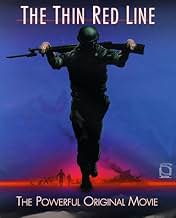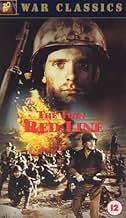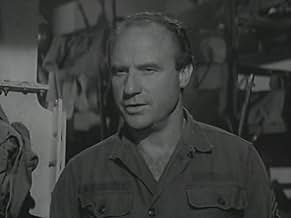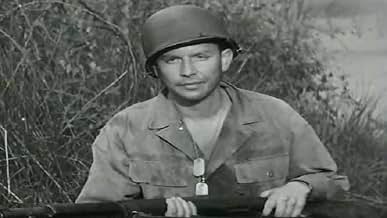In Guadalcanal during World War II, a private and his sergeant clash during the heat of battle with the Japanese.In Guadalcanal during World War II, a private and his sergeant clash during the heat of battle with the Japanese.In Guadalcanal during World War II, a private and his sergeant clash during the heat of battle with the Japanese.
Bob Kanter
- Fife
- (as Robert Kanter)
Jim Gillen
- Capt. Gaff
- (as James Gillen)
Stephen Young
- Stack
- (as Stephen Levy)
- Director
- Writers
- All cast & crew
- Production, box office & more at IMDbPro
Featured reviews
Like some other commenters, I saw the 1998 version before seeing this version. I had expected a somewhat jingoistic war film, but was surprised that this turned out to be superior to the 1998 remake in every way but one. Of course the one aspect that was lesser was the depiction of graphic violence, and that was only due to the changing times and audience, and modern film effects that can show things more realistically in graphic fashion. However, I do not consider this a positive, but only stating that the technical ability to show graphic violence has improved. I would say that the story in this one is more engaging, more concise and without losing the effect of alienation that both try to convey, and in fact that effect is much more visible here in this depiction. I found the acting to be solid and less melodramatic than the 1998 version, and the soldiers actions all ring true to what would have been going on in WW II at Guadacanal, without hystrionics. It's quite interesting that this version, coming right before the Vietnam era would be cynical about war but also considerably mindful of the necessity of the particular war it depicts and of the need for the soldiers to do as they did. Whereas the post-Vietnam 1998 version is also cynical, yet much more so, showing the military as a bumbling bureaucracy of sorts and attempting to depict the battle as pointless, extending that depiction to the war in general, and it actually is an unstated allegory about Vietnam. I would say that the 1998 film boasts a production group fairly unaware of the overall reality of WW II, and still stuck in the miasma of Vietnam.
The first interpretation of James Jones' novel is an OK movie. Nothing really stuck with me, though. It condenses about five characters each into the two lead characters in order to make a well rounded film that fairly expresses Jones' ideas on men in war. It is an interesting psychological study on men, not under stress, but facing death, either from a distance, or up close. There are some great moments in this, and the acting is superb. I did think, though, that the sexual feelings of the novel did not translate so well into the early 60's film. The battle are also utterly unconvincing. Death is still portrayed as a somewhat painless event (with the near exception of one great scene), it leans more to the earlier gung ho war movies than, say, Paths of Glory or All Quiet on the Western Front. The battle scenes are ultimately silly and cartoonish. Two men climb a cliff because the valley below is mined. One knocks over a big rock that causes a chain reaction and all the rocks fall into the valley and clear the mine field. This kind scene is not meant to be surreal, so it loses on the realism scale. This is not the way Jones wanted war depicted. The kind of silly inventiveness of the battle scenes does not exist in all out combat. But, I must say, it does succeed in some scenes, and the performances are all great. I must also say that the end is extremely powerful. It made all the cheesey set pieces and battle scenes disappear from my mind. That last shot is the tone of Jones' novels, a tone From Here to Eternity got right all the way through, and Terrence Malick's Thin Red Line also successfully portrayed (But stepped away to alow contemplation, not to experience.) That last scene makes it a good movie, but it couldn've been done better. Actually, it was done better. I still recommend it. It has its ideas in the right place, but its execution is a bit showy and not realistic enough.
The last line in the novel reads as follows:"One day one of their number would write a book about it all, but none of them would believe it, because none of them would remember it that way."
Jones was saying that their is a tendency to (for lack of a better term) gloss over what happened in war, and the way people write about war, and the way people film war, is not at all how veterans remember it.
This film is not really at all what Jones was writing about. The film fails to find any horror in the war-- it fails to show the war as written by James Jones.
It is rather interesting to watch, because it shares many scenes with the Terrence Malick film (which is the far superior work), and it is fun to compare the scenes.
That said, the two actors who play Col. Tall and Stone (Stein in the book, Staros in the Malick film) are both laugh out loud bad, and seem to be completely ignorant of how to effectively portray their characters (Nolte and Koteas, on the other hand, aren't).
But to give the film some credit, it features a great performance by Kier Dullea or 2001: A Space Oddyssey fame, and an interesting one from Jack Warden as Welsh.
I think that the film tries to show the horror, but the production code, the script, or director didn't want to or couldn't figure out how to. I appreciated this film more for what it tried to say than what it actually said or HOW it said it. I would marginally reccommend it, mainly to those unfamiliar with the superior Malick film.
Jones was saying that their is a tendency to (for lack of a better term) gloss over what happened in war, and the way people write about war, and the way people film war, is not at all how veterans remember it.
This film is not really at all what Jones was writing about. The film fails to find any horror in the war-- it fails to show the war as written by James Jones.
It is rather interesting to watch, because it shares many scenes with the Terrence Malick film (which is the far superior work), and it is fun to compare the scenes.
That said, the two actors who play Col. Tall and Stone (Stein in the book, Staros in the Malick film) are both laugh out loud bad, and seem to be completely ignorant of how to effectively portray their characters (Nolte and Koteas, on the other hand, aren't).
But to give the film some credit, it features a great performance by Kier Dullea or 2001: A Space Oddyssey fame, and an interesting one from Jack Warden as Welsh.
I think that the film tries to show the horror, but the production code, the script, or director didn't want to or couldn't figure out how to. I appreciated this film more for what it tried to say than what it actually said or HOW it said it. I would marginally reccommend it, mainly to those unfamiliar with the superior Malick film.
Grim psychological study of two Marines on Guadalcanal, each seemingly trying to top the other in body count of Japanese slain, not for God, country, or to win the war, but for the sheer joy of killing.
Extremely realistic combat sequences coupled with Dullea's excellent portrayal of the on-the-edge-of-madness Pvt. Doll make this one of my favorite war films.
Extremely realistic combat sequences coupled with Dullea's excellent portrayal of the on-the-edge-of-madness Pvt. Doll make this one of my favorite war films.
Oops, I got this film by accident, I thought it was the 1998 version. After almost taking it back, I decided to watch it and was glad I did. This is really a very good film working on the characters and situations without having to rely on the star appeal or visual effects as modern films. Do yourselves a favour and repeat my mistake.
Did you know
- TriviaThe film's title comes from James Jones's novel and, in turn, from an old saying. In the movie, Captain Stone, played by Ray Daley, says, "I remember an old Midwest saying, 'There's only a thin red line between the sane and the mad.' "
The original 'Thin Red Line' refers to the routing of a Russian cavalry charge by the Sutherland Highlanders 93rd (Highland) Regiment during the Battle of Balaklava on 25 October 1854, during the Crimean War.
- GoofsFor some reason the Japanese soldiers are at times are armed with German Schmeisser SMG's.
- ConnectionsFeatured in The 80th Annual Academy Awards (2008)
- How long is The Thin Red Line?Powered by Alexa
Details
- Runtime1 hour 39 minutes
- Color
- Aspect ratio
- 2.35 : 1
Contribute to this page
Suggest an edit or add missing content

Top Gap
By what name was L'attaque dura sept jours (1964) officially released in Canada in English?
Answer

























